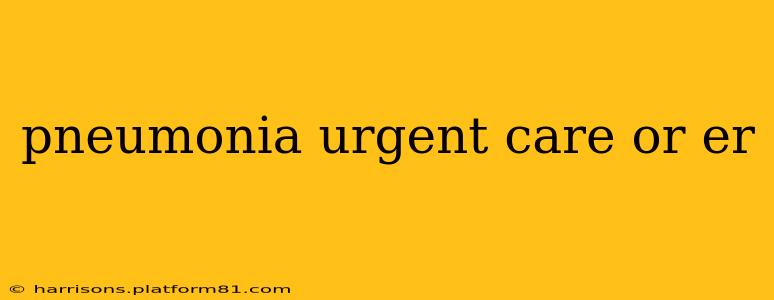Pneumonia, an infection causing inflammation in the air sacs of one or both lungs, can range in severity from mild to life-threatening. Knowing when to seek treatment at an urgent care clinic versus the emergency room (ER) is crucial for timely and effective care. This guide helps you understand the differences and make informed decisions about your health.
What are the Symptoms of Pneumonia?
Recognizing pneumonia symptoms is the first step in getting appropriate care. Common symptoms include:
- Cough: Often producing phlegm (mucus) that may be green, yellow, or even bloody.
- Fever: High temperature, often accompanied by chills and sweating.
- Shortness of Breath: Difficulty breathing, even at rest.
- Chest Pain: Sharp or stabbing pain that worsens with deep breaths or coughs.
- Fatigue: Extreme tiredness and weakness.
- Confusion: Especially in older adults.
- Nausea, Vomiting, or Diarrhea: These gastrointestinal symptoms can sometimes accompany pneumonia.
When Should I Go to Urgent Care for Pneumonia?
Urgent care is a good option if you suspect you have pneumonia but your symptoms are not life-threatening. Consider urgent care if you experience:
- Mild to moderate symptoms: A cough producing some phlegm, a low-grade fever, and some shortness of breath.
- Symptoms are gradually worsening: Your condition is deteriorating slowly, and you aren't experiencing severe respiratory distress.
- You need a quicker appointment than your primary care physician can offer: Urgent care centers generally offer shorter wait times than doctors' offices.
Important Note: Even at urgent care, a medical professional will assess your condition. If they determine your pneumonia is severe, they will likely refer you to the ER for immediate, more intensive care.
When Should I Go to the ER for Pneumonia?
Seek immediate medical attention at the ER if you have any of the following:
- Severe shortness of breath or difficulty breathing: This is a critical sign indicating potential respiratory failure.
- High fever (103°F or higher): A very high fever suggests a severe infection.
- Chest pain: Sharp chest pain that worsens with each breath could indicate a serious complication.
- Confusion or disorientation: Especially concerning in older adults, this could signal a severe infection impacting the brain.
- Rapid heart rate: A fast or irregular heartbeat warrants immediate medical evaluation.
- Bluish discoloration of the lips or skin (cyanosis): This indicates a severe lack of oxygen in your blood.
- Persistent vomiting or diarrhea: Severe dehydration due to these symptoms needs immediate medical attention, especially if coupled with other pneumonia symptoms.
What if I have underlying health conditions?
Individuals with pre-existing conditions like heart disease, lung disease (such as COPD or asthma), diabetes, or weakened immune systems are at higher risk of severe complications from pneumonia. For these individuals, even seemingly mild symptoms warrant prompt medical evaluation, potentially requiring an ER visit.
How is Pneumonia Diagnosed?
Diagnosing pneumonia typically involves a physical examination, listening to your lungs with a stethoscope, and possibly some imaging tests like a chest X-ray. Blood tests may also be performed to identify the type of infection.
Can Pneumonia Be Treated at Urgent Care?
Urgent care facilities can often treat milder cases of pneumonia with antibiotics and supportive care, such as rest, fluids, and pain relief medication. However, the severity of your case dictates the appropriate level of care.
What if my symptoms improve after a few days?
Even if your symptoms improve, it's crucial to complete the full course of antibiotics prescribed by your doctor to prevent the infection from returning or developing complications. Follow-up appointments are essential to ensure complete recovery.
What are the potential complications of pneumonia?
Untreated or severe pneumonia can lead to serious complications, including:
- Respiratory failure: Inability of the lungs to provide enough oxygen to the body.
- Sepsis: A life-threatening bloodstream infection.
- Lung abscess: A pus-filled cavity in the lung.
- Pleurisy: Inflammation of the lining surrounding the lungs.
This information is for general knowledge and does not constitute medical advice. Always consult a medical professional for diagnosis and treatment of any health concerns. Your individual circumstances will determine the best course of action. Don't hesitate to seek medical attention if you are concerned about your symptoms.
